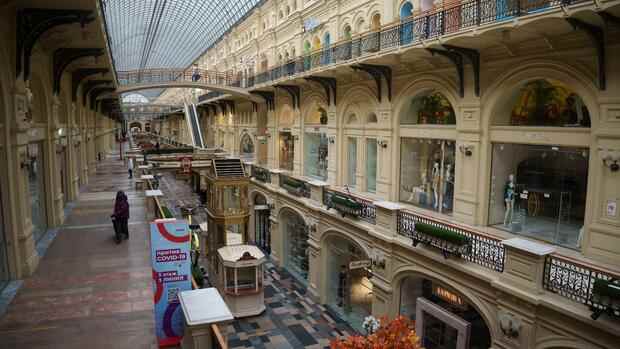Moscow The coronavirus continues to spread unhindered in Russia. On Friday, the corona control operations team reported 1,163 deaths within 24 hours – the highest figure since the pandemic began. The number of infections has also been at a record level for weeks, on Thursday they were over 40,000, the Friday value is only slightly below.
The operationally reported figures probably only reflect half of the actual catastrophe. The statistics agency Rosstat, whose numbers always come with a delay of about two months, reported in the last few months in some cases twice as high the number of victims as the Covid operation staff.
According to demographer Alexei Raksha, the natural population decline (excluding immigration) last year (from October 2020 to September 2021) was one million people. In view of the recent drastic increase in infection rates, the number threatens to be over a million by the end of the year.
In view of the developments, the Kremlin has initiated a week-long lockdown. Throughout Russia, work is to be suspended between October 30th and November 7th in all companies and authorities that are not systemically important. In many regions, some of the restrictions came into force beforehand, and in Moscow since Thursday.
Top jobs of the day
Find the best jobs now and
be notified by email.
Many business people are worried about their stores – including the Moscow cafe owner Pavel. Since the opening last autumn, there has been no big turnover. He’s just out of the red. Now it has to close again for a week – at least.
Russia avoided lockdown for a long time
The problem: he invested more than a million rubles, around 12,000 euros, in the café. It should be the basis of his livelihood, finance a new apartment for the family. The construction company has just handed over the keys to the 80 square meters. The bare walls are not ready to move into.
“I still have to put in at least half a million rubles (6,000 euros) for renovation costs,” Pawel calculates. The new building is also encumbered with a mortgage. Without the income from the café, things will be tight. He can survive the ten days currently imposed by the Moscow city council, but the risk of an extension is high.
The Kremlin is aware of the social needs. In spring 2020, when Russia imposed the first lockdown, the population was seething. Because at that time there was hardly any state aid to absorb the financial losses. This is one of the reasons why the Russian leadership later always refrained from curtailing public life too drastically.
Despite the world’s first approved vaccine against Covid-19, the country could not breathe a sigh of relief. Sputnik V was intended to be a remedy and an image driver at the same time. But now the Kremlin is in ruins. There is hardly any international recognition of the vaccine – the EU, for example, has not yet registered the vaccine. Moscow sees political motives here.
Low willingness to vaccinate: the population distrusts the government
But the vaccination campaign in the country is also a fiasco: 49 million Russians have been vaccinated so far. That’s just a third of the population. According to surveys, more than half of Russians are still against vaccination.
It was only with considerable pressure that the state managed to make any significant progress in vaccination in the summer. Public service, state-owned corporations, but also smaller companies in the service sector had to meet quotas for immunization. Because the principle of voluntariness had hardly worked before.
The reason for this is also a massive distrust of the population towards politics as a whole. In addition, the Kremlin itself has sent out contradicting signals on several occasions. Vladimir Putin actually declared the pandemic defeated as early as the summer of 2020 when he wanted to hold the victory parade and the constitutional referendum for the extension of his term in office.
Under these circumstances, the awareness-raising campaign barely catches on. On the contrary: In hardly any other country are conspiracy theories and fatalism as widespread as in Russia.
Instead of a compulsory break: Russians are planning a vacation
Despite the massive spike in corona infections and deaths, the Kremlin has failed to clarify the urgency of the lockdown. Even Putin’s choice of words, who speaks of “days off” instead of “lockdown”, does nothing to sharpen the senses.
Taxi driver Semjon, for example, wants to continue working in the coming days. “Vaccinated people die too,” he says. He is convinced that the regulations only apply to larger companies. The 60-year-old once worked in the factory in the industrial metropolis of Izhevsk.
He has been traveling in Moscow for three years and lives in a cheap hostel. He couldn’t afford to stay at home for a week, after all, in addition to the accommodation, he also had to pay the rent for the taxi, says Semjon.
Even those who can financially afford the forced break do not stay at home: Immediately after Putin’s announcement, inquiries from the Aviasales ticket portal increased significantly. On the first day alone, 53 percent more Russians were looking for plane tickets. Particularly popular: Sochi, Krasnodar and Simferopol in southern Russia.
In Sochi alone, 120,000 tourists are expected in the coming week. The rush should help to force the spread of the infections and to exacerbate the difficult situation in the hospitals in the region. Virologist Alexander Schestopalow does not expect the corona wave to subside until December.
More: From savior to problem supplier: Russia keeps millions of people waiting for the promised Sputnik vaccine
